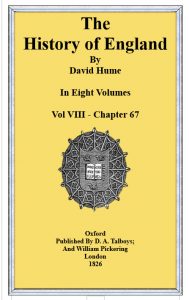CHARLES THE SECOND.
THE English nation, ever since the 1678. fatal league with France, had entertained violent jealousies against the court ; and the subsequent measures adopted by the king had tended more to increase than cure the general prejudices. Some mysterious design was still suspected in every enterprise and profession: arbitrary power and popery were apprehended as the scope of all projects: each breath or rumour made the people start with anxiety : their enemies, they thought, were in their very bosom, and had gotten possession of their sovereign’s confidence. While in this timorous, jealous disposition, the cry of a plot all on a sudden struck their ears : they were wakened from their slumber; and like men affrightened and in the dark, took every figure for a spectre. The terror of each man became the source of terror to another. And an universal panic being diffused, reason and argument, and common sense and common humanity, lost all influence over them. From this disposition of men’s minds we are to account for the progress of the popish plot, and the credit given to it; an event which would otherwise appear prodigious and altogether inexplicable.
The Popish Plot
On the twelfth of August, one Kirby, a chemist, accosted the king as he was walking in the park: “Sir,” said he, ” keep within the company: your enemies have a design upon your life; and you may be shot in this very walk.” Being asked the reason of these strange speeches, lie said, that two men, called Grove and Pickering, had engaged to shoot the king, and sir George Wakeman, the queen’s physician, to poison him. This intelligence, he added, had been communicated to him by doctor Tongue, whom, if permitted, he would introduce to his majesty. Tongue was a divine of the church of England; a man active, restless, full of projects, void of understanding. He brought papers to the king, which contained information of a plot, and were digested into forty-three articles. The king, not having leisure to peruse them, sent them to the treasurer, Danby, and ordered the two informers to lay the business before that minister. Tongue confessed to Danby, that he himself had not drawn the papers; that they had been secretly thrust under his door ; and that, though he suspected, he did not certainly know who was the author. After a few days he returned, and told the treasurer, that his suspicions, he found, were just; and that the author of the intelligence, whom he had met twice or thrice in the street, had acknowledged the whole matter, and had given him a more particular account of the conspiracy, but desired that his name might be concealed, being apprehensive lest the papists should murder him.
